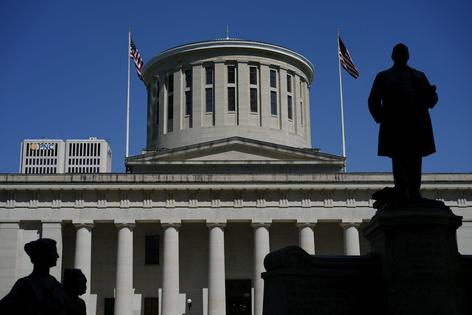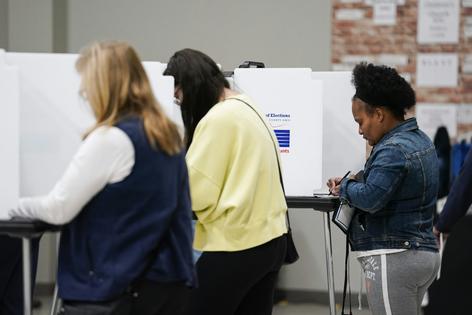An obscure provision of Ohio law could keep Biden off the ballot there in November
Published in Political News
President Joe Biden might not appear on the November 2024 presidential ballot in Ohio. Ohio law requires that presidential candidates be certified – that is, the state must be notified that presidential candidates have been officially nominated – 90 days before the general election in order to get on the ballot. That is the earliest deadline of any state.
But the Democratic National Convention that will formally nominate Biden won’t open until nearly two weeks after Ohio’s Aug. 7 deadline. The Republican National Convention will wrap up nearly three weeks before the deadline, so Donald Trump won’t have a problem getting on the ballot.
The 90-day deadline has often caused trouble since its adoption in 2010. Only in 2016 did both parties’ conventions take place before the Ohio cutoff date. Both conventions took place after the deadline in 2012 and 2020, and legislators extended the deadline both times. This is the first time that only one convention comes too late, but Republicans could well be affected in the future.
There are ways to resolve this problem, as two other states with early deadlines have already done. Washington state officials said they will accept a provisional certification of Biden’s nomination before the convention. And Alabama’s Legislature shortened its deadline so that Biden could qualify for the ballot there.
Neither solution seems likely in Ohio, where Republicans may be seeking to make life harder for the Democrats’ presidential nominee. The attorney general says the state can’t accept a provisional certification. And the Legislature couldn’t come up with a timely fix to the law.
Ohio laws generally take effect 90 days after passage. So a change to the deadline had to pass by May 9, but the Legislature wound up doing nothing. Here’s how that played out.
Republicans have supermajorities in both houses of the Ohio Legislature, yet they couldn’t agree on how to proceed.
The Ohio Senate passed a bill, but only after adding what Democrats viewed as a poison pill that would have banned foreign nationals from contributing to campaigns for or against ballot measures. Republicans objected to a Swiss national’s rumored contributions to a successful campaign last year in which voters approved a reproductive-rights amendment to the state constitution.
The House had planned to consider a different proposal but never voted on anything before leaving town on May 8 for two weeks.
This reflects the Ohio GOP’s bitter divisions. The House speaker won his position with support from only a minority of his caucus. The Senate president will switch to the House next year because of term limits and has hinted he will challenge the speaker.
The Legislature could still pass an emergency law to change the deadline, but emergency laws require a two-thirds vote in both houses. The chances of that happening are uncertain at best.
So, Democrats might have to file a lawsuit to get Biden on the ballot.
As a constitutional law scholar, I believe Democrats would have a strong argument that using an arbitrary and unusually long deadline to bar a major-party presidential candidate violates voting and associational rights under the First and 14th amendments. But success is not guaranteed.
Such a lawsuit would rely on two U.S. Supreme Court cases that rejected state efforts to bar presidential candidates from the ballot.
A 1983 decision struck down Ohio’s old law that required independent candidates to qualify more than six months before the election. And a March 2024 ruling rejected Colorado’s effort to exclude former President Donald Trump from its primary ballot.
Those cases may be helpful in making the Democrats’ case, but they don’t dictate a win. The 1983 decision overturned a law that treated independent presidential candidates much less favorably than party candidates. Ohio’s 90-day deadline treats all candidates the same.
And the Colorado case involved the state’s unilateral determination that Trump was ineligible for office as an insurrectionist under the 14th Amendment. Ohio’s 90-day rule says nothing about whether a candidate is constitutionally disqualified.
Those differences might not matter. Even if they do, a lawsuit still could win.
Ohio’s 90-day deadline is not only arbitrary, I believe that it is irrational. Nobody seems to know why the state extended the deadline from 60 to 90 days in 2010. The change came in an obscure provision of a 341-page bill.
The 90-day deadline has been a problem in almost every presidential election since then. The Legislature waived the deadline in 2012 and 2020, when both parties’ conventions fell after the cutoff date, and those elections ran smoothly. So the state can’t justify sticking with the 90-day rule this year when only one party is holding its convention after the deadline.
Biden probably won’t carry Ohio in any event. But having both major-party candidates on the ballot is necessary for a fair presidential election.
Everyone involved keeps saying that Biden will appear on the November ballot. But, at least for now, the law says otherwise.
This article is republished from The Conversation, a nonprofit, independent news organization bringing you facts and trustworthy analysis to help you make sense of our complex world. It was written by: Jonathan Entin, Case Western Reserve University
Read more:
Supporting ‘democracy’ is hard for many who feel government and the economy are failing them
Justice Sotomayor’s health isn’t the real problem for Democrats − winning elections is
Neighbors Ohio and Michigan are moving further apart in politics – differences in ballot access may explain why
Jonathan Entin does not work for, consult, own shares in or receive funding from any company or organization that would benefit from this article, and has disclosed no relevant affiliations beyond their academic appointment.


































































Comments